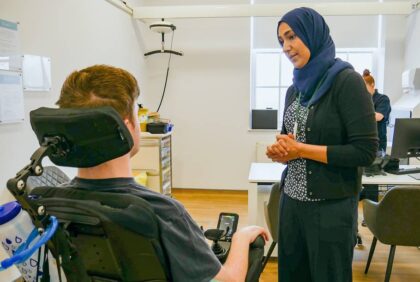Understanding Opportunity
Assessment tends to be detailed and can involve other members of our multidisciplinary team, to ensure the position is clear.
Difficulty producing speech may be an issue, either at all, or in a way that can be readily understood. This could be due to physical causes, neural issues, or not being able to remember words.
Those symptoms are common after stroke, or brain injury and can be accompanied by an inability to recognise written words. The area of our brain which manages speech also relates to memory and problem solving.
Physical constraints may be able to be addressed with tongue, or mouth exercises, or working on wider facial movement. Exercise can help with controlling your expression, in itself a form of communication.
Language skills can be relearned by reading out loud, or through word games, which also help with cognition. Technology can play a part, either designed for speech and language therapy, or broader cognitive rehabilitation.
Whilst our brain cells can not regenerate, the brain has an innate ability to reroute requirements to fresh areas. Patience, technological assistance and a skilled speech and language therapist are a useful mix to help achieve this.
Meeting Core Objectives
Speech & language therapists help with dysphagia, difficulty with swallowing, eating, or drinking, providing assessment, treatment and education . Where required, this will be given priority, alongside core areas of communication:
-
Being Understood
The ability to use your voice and do so with reasonable fluency, so you are clearly understood by others.
-
Making Your Point
Comprehending language construction and nuance, to ensure the words you use have the meaning you intended.
-
Adding Subtlety
Being aware of other elements of communication, from understanding others, to the use of human expression.
Each of the points above contribute to a primary objective. To bring back, or create the ability to converse with others, making life more manageable and enjoyable.
Vocational rehabilitation can include speech and language therapy, particularly after brain injury, or stroke. Helping to rebuild the ability to return to work, or pursue other key activities.
Taking Part In Therapy
Speech and language therapy is a mix of science, education, linguistics and medicine. How they apply to each individual’s needs will be understood before therapy starts, to help ensure that the effort they make brings improvement.
No matter what is affecting your ability to speak, or communicate effectively, progress is normally possible. Whilst sudden leaps of comprehension can be made, recovering skills will often take time and committment.
This could be alongside other rehabilitation activity, which can add to development. Our whole team share your wish for progress and offer all the support you need.
They appreciate that communication is central to life and that removing barriers to this can help to take so much else forward.
